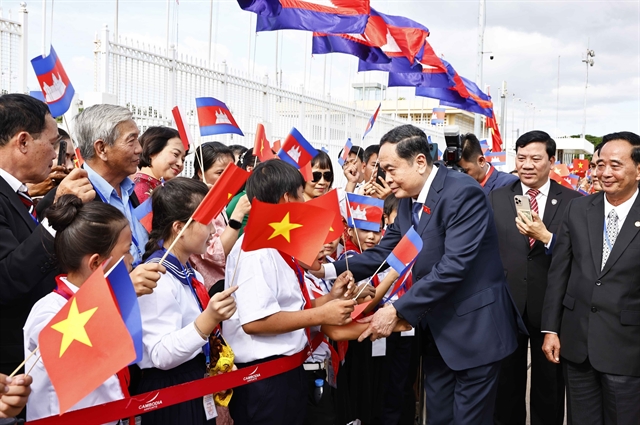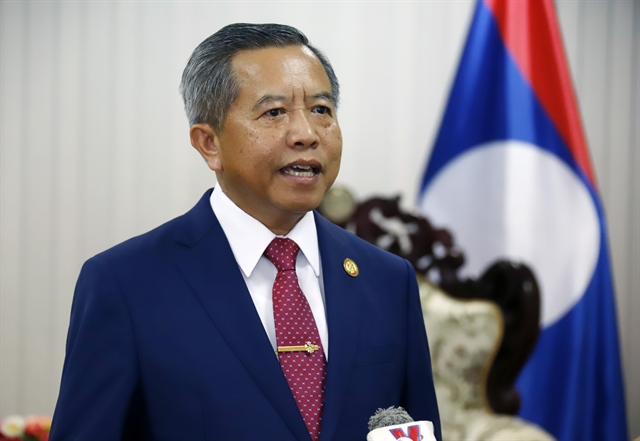 Politics & Law
Politics & Law


|
| Lao Minister of Technology and Communications Boviengkham Vongdara for the interview with Vietnam News Agency. — VNA/VNS Photo Bá Thành |
VIENTIANE — The Điện Biên Phủ Victory was a brilliant epic in the struggle against French colonialism and a decisive factor helping open a new stage for the revolution of the three Indochinese countries of Việt Nam, Laos and Cambodia, according to Lao Minister of Technology and Communications Boviengkham Vongdara.
In an interview granted to the Vietnam News Agency on the occasion of the victory’s 70th anniversary (May 7, 1954-2024), Boviengkham Vongdara, who is also Chairman of the Laos-Việt Nam Friendship Association, said that it was also a decisive victory making the French colonialists completely defeated in Indochina, and had a huge impact on the anti-colonialism movement in the world.
The triumph also demonstrated the coordination of the combat alliance between the armies of Việt Nam and Laos in particular, as well as the three Indochinese countries in general, in the struggle against the French colonialists.
The Indochinese Communist Party was founded in 1930 under the great leadership of President Hồ Chí Minh. After its establishment, the party led the people of the three Indochinese countries in carrying out revolutions and achieving victories. In Việt Nam, after the successful August Revolution, on September 2, 1945, Việt Nam declared independence, which was an important factor in aiding the revolutionary process in Laos to also achieve victory and declare independence on October 12, 1945, the Lao minister recounted.
However, after our two countries declared independence, the French colonialists did not accept it and initiated attacks to invade Indochina for the second time.
After eight years of fierce resistance, faced with the continuous victories of the armies and people of both Laos and Việt Nam, the French colonialists deployed troops to Điện Biên Phủ to establish a stronghold described as "invincible" in order to suppress the revolutionary movements in both countries.
Given this situation, the Politburo of the Central Committee of the Communist Party of Việt Nam decided to launch the ĐIện Biên Phủ Liberation Campaign – appointing the legendary general Võ Nguyễn Giáp as the Commander-in-Chief of the campaign, which eventually prevailed over the French forces, he said.
The Lao minister also quoted late President Kaysone Phomvihane as saying that this was the victory with the most important significance for the Lao revolution at that time, helping its struggle for national liberation enter a new phase and leading to the establishment of the Lao People's Revolutionary Party on March 22, 1955.
According to the minister, the great victory of the Điện Biên Phủ Campaign had great and important significance in the coordination between the armies of Laos and Việt Nam in the following campaigns and battles, including the struggle against US imperialists.
One of the outstanding highlights of the Laos-Việt Nam combat alliance's cooperation is that their joint building of the Hồ Chí Minh trail through Việt Nam and Laos to supply and transport military forces and goods to serve the revolution of the two countries.
The trail contributed greatly to Việt Nam’s liberation of the South and national reunification on April 30, 1975, and helped Laos overthrow the monarchy and establish the Lao People's Democratic Republic on December 2, 1975.
It can be said that the US imperialists suffered a painful defeat partly due to the extremely close cooperation of the combat alliance between the Lao and Vietnamese armies, Boviengkham Vongdara affirmed.
He again said that Kaysone has been more than accurate in saying that "In the history of the world revolution, there have been many shining examples of international proletarian spirit, but nowhere and never before has there been such a special, long-lasting, comprehensive alliance of struggle [like the one between Việt Nam and Laos].”
Amidst complicated and unpredictable developments of the regional and world situations, Laos and Việt Nam should maintain their traditional relations, and continue educating the young generations on their close and special solidarity, the Lao official noted. — VNS